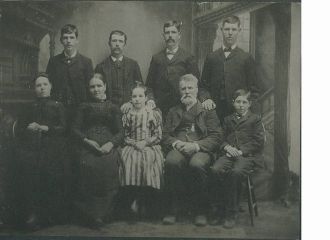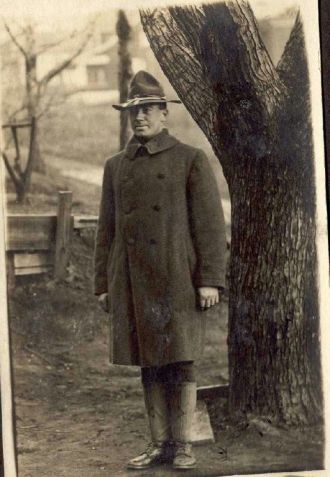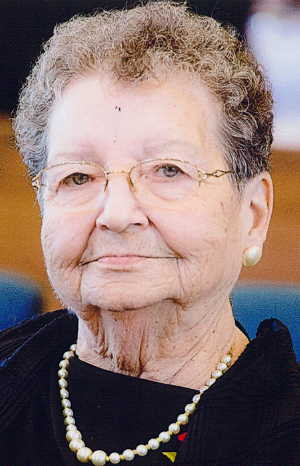Dowis Family History & Genealogy
Dowis Last Name History & Origin
AddHistory
The information in the below notes has been obtained through websites and other sources. Everyone should be interested in their heritage. From our heritage we can be informed about our place in this world. With a little bit of imagination, some of the stories we read or hear as we explore the past can be very entertaining and informative. We can learn about the circumstances of our ancestors and using our imagination, we can "flesh out" the story lines.
As time continues, we are losing touch with the occurrences of the 17th, 18th, 19th and to a lesser extent the 20th centuries. Mr. William Jasper Dowis is one among a group of individuals who have taken an interest in attempting to document the past. He has written a manuscript called "Notes on The DOWIS Family". In the document, Mr. Dowis has attempted to link some of the information that he and others have developed over the years. Following is a transcription of that document written and maintained by Mr. Dowis and originally dated April 20, 1987 (though subsequently updated).
The Dowis family has had a varied and somewhat lively existence as evidenced by what I have seen and is known to date. In reading about the family, I have read of the famous Oklahoma Land Rush when the federal government gave away great blocks of land to individuals who could stake a claim to a piece. There are references to John C. Calhoun, George Washington, George the III of England and William Bull, the War of 1812 as well as Jesse and Frank James. The Dowis family has had great sports figures and published authors as well as a member being a part of The Manhattan Project during World War II.
The family has been involved with the War of Insurrection (The War Between the States) and we are privileged to have a firsthand account of the aftermath of the conflict. There are also the infamous episodes of the family to include legal entanglements, murder, a hanging, and even a case where one of the Dowis ancestors poisoned his mother with strychnine. On the lighter side, we have a firsthand account of two canoe trips down the Chattahoochee River to the Gulf of Mexico in the late 1880's. These trips were made during the winter and were hunting and trapping trips.
My connection to the Dowis family is through my wife Mary Teague Mason. She is the Daughter of Lola Dowis Teague who was the baby of 19 siblings born to William Calvin and Hannah Burdette Dowis of Duluth Georgia. She is a descendant of what Mr. Dowis refers to as "The Atlanta Group". To date, I have documented more than 300 direct descendants of William Calvin Dowis in 8 generations and counting. Additionally, I have taken the documentation of William Jasper Dowis and compiled my research as well as his into a family tree in excess of 1500 names and counting.
Name Origin
The dwelling place of the German family from which the immigrants came is not known. However, many of the German immigrants of that period were from the Palatines area along the Rhine River. In the words of Morison in Growth of the American Republic:
Discontented Germans came to English America because the German states had no overseas possessions, and no colonies except those of the English would accept foreigners. The principal groups that came over were the so-called Palatines, ruined by French invasions of the Rhenish Palatinate; the Mennonites, the Unitas Fratum or Moravians, the Dunkards (German Quakers); and pietists whose relation to the Lutherans was somewhat similar to that of the Methodists to the Church of England. Many of the vanguard were assisted by the English Government to come to America and to obtain land grants; thousands of others came over as 'redemptioners.' These people were given free transportation from Germany or Holland by shipowners, who recouped themselves by selling their passengers as indentured servants.
In the words of Robert Bass in Ninety-Six:
Stirred by Riemensperger's advertisements, in 1752 some fifteen hundred Germans from around Baden and Wurttemberg sailed for Charleston. After a series of errors and miscalculations, largely resulting from a lack of government finances, a majority of these immigrants stopped in Amelia. The others settled in Dutch Fork.
And, as told to me by Fred M. Dowis, of whom I will speak later:
"A group of Germans established a settlement named Londonborough in 1765 along Hard Labor Creek in what is now Greenwood County, South Carolina. These Germans were sometimes referred to as Palatines from their native Rhine valley region. The German pioneers were victims of misfortune from the beginning and their community Londonborough was never a thriving one. Many left after a few years to join older and more prosperous German settlements in Newberry, Richland, and Orange counties.
The initial promoter of the German expedition was Col. John Henry Christian de Stumpel. He persuaded several hundred German Protestants to sell their property and immigrate to America, going by way of London where he was to make arrangements for passage and grants of land. Col Stumpel failed to get land grants but collected all the money the Germans had and disappeared, leaving them stranded in London.
The Germans suffered great hardship. A humane clergyman who came from the same county took compassion on them and published their deplorable case in the newspapers. Help came from a great personage, the King, with a bounty of 300 pounds. London citizens followed this example with medical supplies plus food and money. Two ships were engaged for the journey and 150 stands of arms were given them for their defense after their arrival in America.
Governor Bull sent an express to Patrick Calhoun to direct him to proceed directly to the spot where the German people were to be settled, and there to build a large log house to shield them on their arrival from the weather. He was to contact the deputy surveyor to proceed with them and survey the lands for them and settle them on it immediately that they might avail thenselves&127 of the earliest opportunity in raising huts and planting their crops.
They were called in and sworn to their petitions and took the oath of allegiance, and were assigned the allotments of land, from 100 to 400 acres each. Named in the minutes are 175 adults and children over the age of 12, 86 children between the ages of 2 and 12, and 45 names of persons who died either aboard ship or after landing in Charleston. A total of about 25,000 acres was allotted to the Germans.
The site of the Londonborough settlement was south or southwest of Powder Springs, a mineral spring still in use near Hard Labor Creek on the J. A. Bannister place. A large flat field stone on that place was the step to the community log house, tradition has it, and if so it is the only physical trace remaining.
Nearly 200 years after the first group of Palatines came, a marker was unveiled November 1, 1964 beside highway 48 near Powder Springs. It commemorates the Londonborough settlement, and was erected by the Greenwood and Edgefield County Historical Societies. The West German Government, through its embassy in Washington, sent a color guard to participate in the unveiling ceremony."
Spellings & Pronunciations
The name has been spelled in many different ways, even in official documents. Among them are:
Dowas Dows Dors
Dowes Dowice Dories
Dowess Dours Dores
Dowiss Dourifs Dowers
Dowifs Daviss
For example, in her research for Dean Dowis a professional genealogist, Jane Revill, reported to him -- "The name was spelled Dowers when the plat was certified; and the grant index shows Dors; the memorial Dories and Dores; but the plat shows Dowis."
In Corbin, Kentucky there is an abandoned church building bearing a wooden sign, Dowas Chapel Methodist Church.
In modern times the name is often mistaken for Davis, as any irritated Dowis wife can attest!
The presence of the f instead of s is, of course, only the old English usage, still in effect in 1770. Otherwise the misspellings are largely the consequence of the fact that many of the early family members could not read or write - they signed documents with their "mark". Also, when handwritten, the junction of the w and the i often looks like an r.
Gradually the spelling became consistent as Dowis, but some census entries as late as 1850 were Dowas or Dowes.
In addition to the above spellings, which pertain to proven members of the family, there are variants among people who have not been tied in with the family, and who may or may not be related. These are:
Dowse
Douse
Dorris
The first two of these have been used interchangeably with Dowes among people living in eastern South Carolina in 1732, appearing to move toward the western part of the state by 1774. The third name Dorris, was that of a family that got a land grant close to that of William Dowis in 1773, and that was judged by Jane Revill to be related to the Dowis family, but with the name accidentally spelled differently. However, after looking into this I found nothing to indicate the relationship.
Nationality & Ethnicity
We don't have any information on the nationality / ethnicity of the Dowis name. Have information to share?
Famous People named Dowis
Are there famous people from the Dowis family? Share their story.
Early Dowises
These are the earliest records we have of the Dowis family.
















Dowis Family Photos
Discover Dowis family photos shared by the community. These photos contain people and places related to the Dowis last name.


The people in the photo are:
Back row L to R:
Jonathan Edgar Dowis, Wesley Dowis, Isaac Dowis, Richard Thomas Dowis (my great grandfather)
Seated L to R:
Laura Dowis Thomas, Eliza Sheets Dowis (mother), Cora Dowis Reginor, Jonathan Dowis (father), Albert Russell Dowis


The First Nebraska Volunteer Infantry was mustered into service on May 9-10, 1898 at Lincoln, Nebraska. At the time of muster-in, the unit consisted of fifty-one officers and 983 enlisted men. On June 15, the unit steamed for the Philippines, where it arrived on July 17. The fighting ended on August 13 with an armistice, and the war formally ended on December 10, 1898 with the signing of the Treaty of Paris. On February 4, 1899 the Philippine American War began.
On July 1, 1899, the First Nebraska left the Philippines for the United States, arriving on July 29, 1899. The unit was mustered out of service on August 23, 1899 at San Francisco, California. At the time of muster out, the unit consisted of forty-five officers and 842 enlisted men.
During its term of service, the 1st Nebraska lost two officers killed in battle with another officer dying from wounds received in battle. In addition nineteen enlisted men were killed in battle with thirteen additional men succumbing to wounds received in battle. Twenty-eight enlisted men died of disease, one man drowned and two men deserted. In total, eleven officers and 166 enlisted men were wounded in battle.
I would love to hear from anyone who has information on this branch of my family! This photo was provided to me by my cousin Cecilia Heinz.
Dowis Family Tree
Discover the most common names, oldest records and life expectancy of people with the last name Dowis.
Updated Dowis Biographies






Popular Dowis Biographies


















Dowis Death Records & Life Expectancy
The average age of a Dowis family member is 73.0 years old according to our database of 238 people with the last name Dowis that have a birth and death date listed.
Life Expectancy
Oldest Dowises
These are the longest-lived members of the Dowis family on AncientFaces.
Other Dowis Records
Share memories about your Dowis family
Leave comments and ask questions related to the Dowis family.
Followers & Sources

